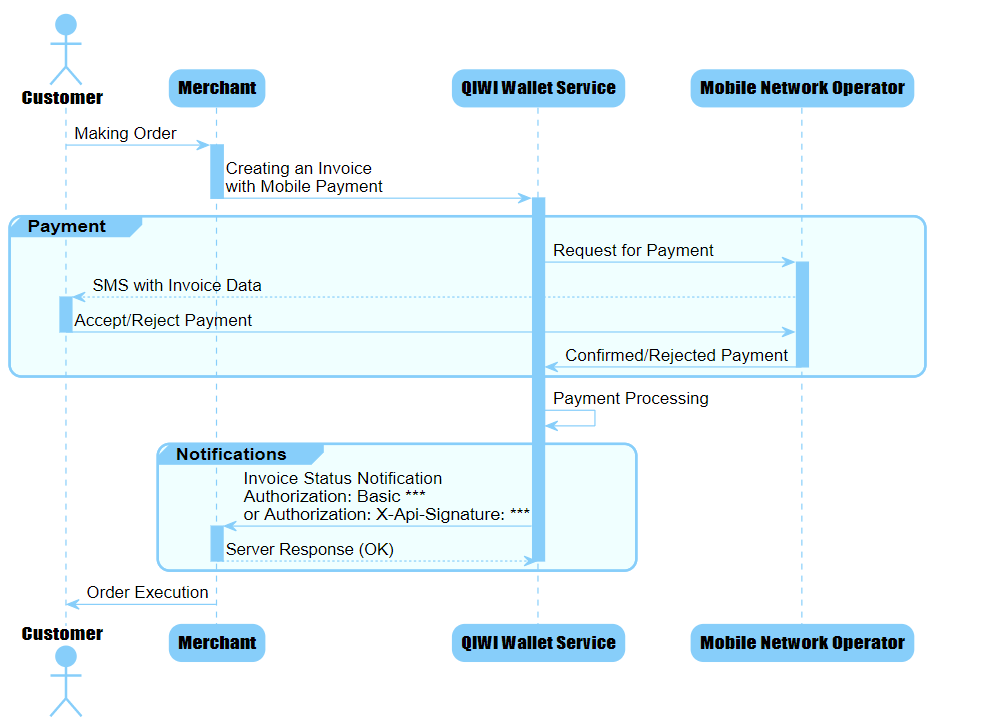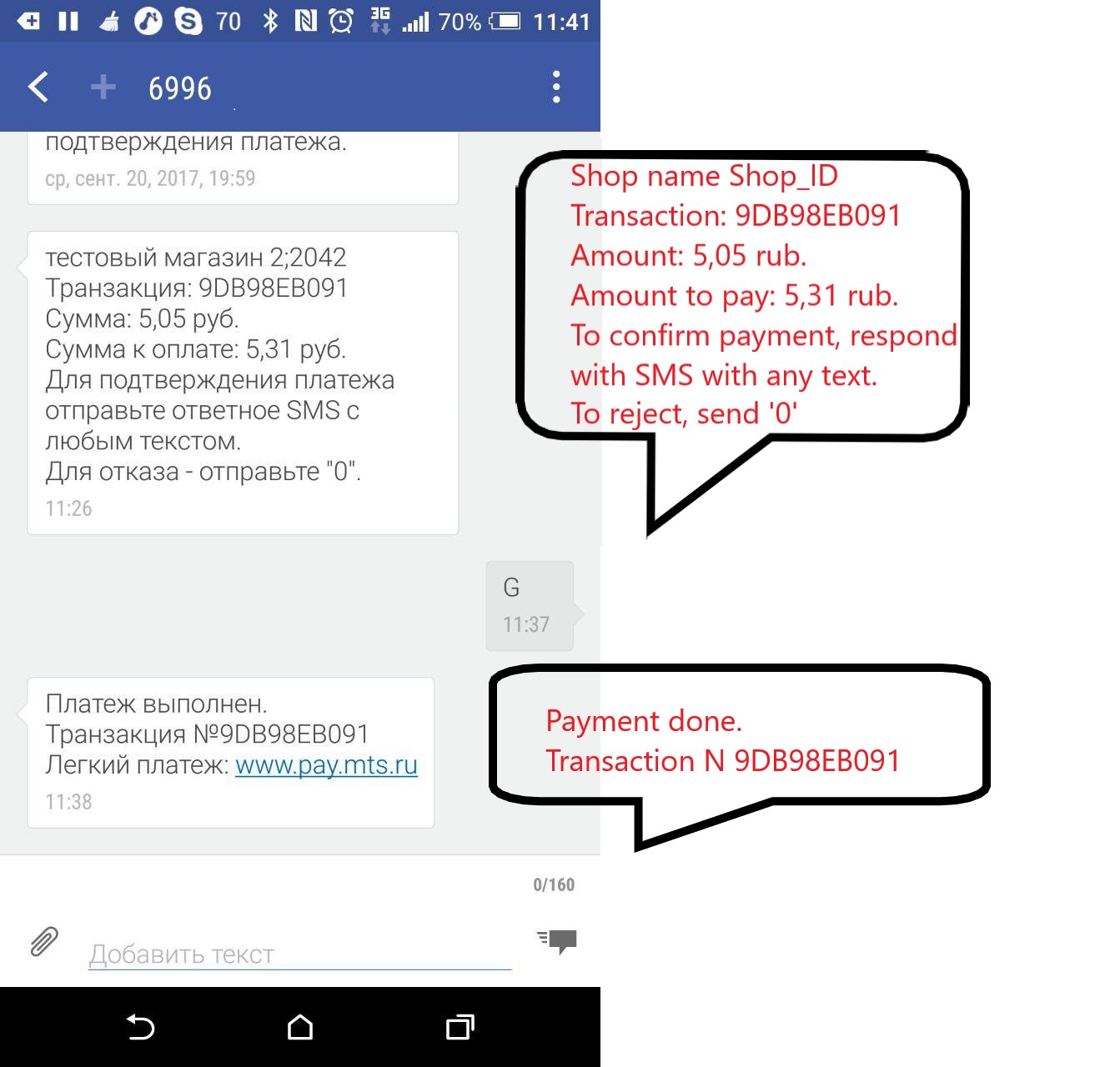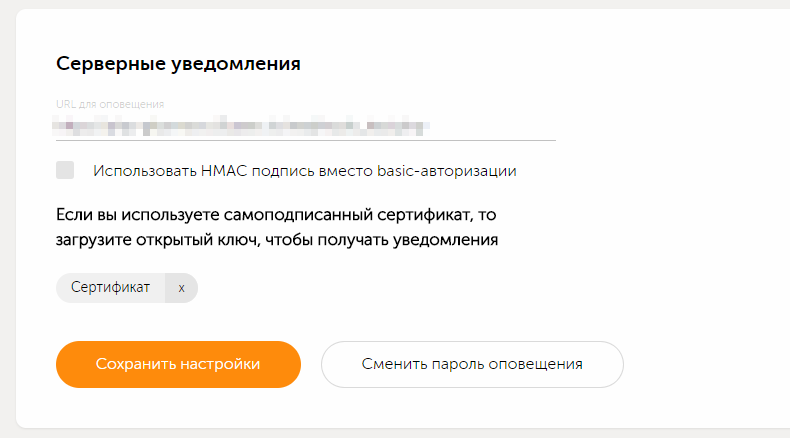Payments From Mobile Account
Edit on GitHub
Mobile payments API provides access to operations with customer's mobile account from your application or service. The following operations are supported:
- Payment initiation
- Checking invoice payment status
- Payment notifications
Customer Order Payment Flow
Payment flow processes as follows:

- The customer puts an order on the merchant's site.
- Merchant makes Initiate Payment request with the authorization parameters.
- Customer receives SMS from their mobile network operator immediately on initiating payment. SMS contains the information about corresponding payment invoice.
-
Customer approves payment by the response SMS. The invoice is automatically rejected when customer rejects the payment.

-
If the merchant enables notifications to merchant's server, then QIWI system sends a notification (web-hook) of the invoice payment to the merchant's server once invoice is paid. Authorization on the merchant's side is required for notifications.
If merchant does not use notifications, they can request current payment status of the invoice.
- When the invoice payment is confirmed, merchant delivers ordered services/goods.
To use API, complete registration and approval of the agreement.
Authorization
Mobile payments API requests are authorized through HTTP Basic-authorization with API ID and API password Header is Authorization string and its value is Basic Base64(API_ID:API_PASSWORD).
curl "server_address" \
--header "Authorization: Basic MjMyNDQxMjM6NDUzRmRnZDQ0Mw=="
Authorization and forms
You can obtain the data on kassa.qiwi.com site
Service data
| Parameter | Description | Type |
|---|---|---|
| API_ID | Required. Provider API identifier for authorization | Integer |
| API_PASSWORD | Required. API password for authorization | String |
| Shop ID | Required. Numeric identifier of the provider's service | Integer |
Payment Initiation
The request initiates a new payment for a specified mobile phone number. Request type - HTTP PUT.
To confirm payment, customer's mobile network operator send SMS with code to the specified phone number.
Request → PUT
curl "https://api.qiwi.com/api/v2/prv/373712/bills/BILL-1" \
-X PUT \
--header "Accept: text/json" \
--header "Authorization: Basic ***" \
-d 'user=tel%3A%2B79161111111&amount=10.00&ccy=RUB&comment=test&pay_source=mobile&lifetime=2016-09-25T15:00:00'
HTTP/1.1 200 OK
Content-Type: text/json
{
"response": {
"result_code": 0,
"bill": {
"bill_id": "BILL-1",
"amount": "10.00",
"ccy": "RUB",
"status": "waiting",
"error": 0,
"user": "tel:+79161111111",
"comment": "Text comment"
}
}
}
URL https://api.qiwi.com/api/v2/prv/prv_id/bills/bill_id
-
Parameters are in the PUT-request URL pathname:
- prv_id - merchant’s Shop ID (numeric value, as displayed in "ID" parameter of "Protocols Settings" section of kassa.qiwi.com web site)
- bill_id - unique invoice identifier generated by the merchant (any non-empty string of up to 200 characters). Uniqueness means that the identifier must not coincide with any of previously issued invoices of the merchant.
HEADERS
- Accept: text/json or Accept: application/json - JSON response
- Content-type: application/x-www-form-urlencoded; charset=utf-8
- Authorization: Basic ***
Parameters
Parameters are sent in the request body as url-encoded formdata.
Parameter|Description|Type
———|——–|——–
user | Required. The QIWI Wallet user’s ID, to whom the invoice is issued. It is the user’s phone number with tel: prefix | String(20)
«««< HEAD
amount | Required. The invoice amount. The number is rounded down with two decimal places | Number(6.2)|Y
=======
amount | Required. The invoice amount. The number is rounded down with two decimal places | Number(6.2)
»»»> 842a7af… Required column is moved to parameter description
ccy | Invoice currency identifier (Alpha-3 ISO 4217 code). Depends on currencies allowed for the merchant in QIWI system | String(3)
comment | Required. Comment to the invoice | String(255)
lifetime | Required. Date and time up to which the invoice is available for payment, URL-encoded ISO 8601 (YYYY-MM-DDThh:mm:ss), Moscow timezone. If the invoice is not paid by this date it will become void and will be assigned a final status.
Important! Invoice will be automatically expired when 45 days is passed after the invoicing date |dateTime
pay_source |Required. A funding source for the payment — the customer's MNO balance | mobile only
The given PHP example implements creation of the invoice. This example demonstrates using merchant's authorization parameters, i.e. shop ID, API ID and password for the API ID. Open the PHP tab on the right.
Response ←
Successful response
HTTP/1.1 200 OK
Content-Type: text/json;charset=utf-8
{
"response": {
"result_code": 0,
"bill": {
"bill_id": "BILL-1",
"amount": "10.00",
"ccy": "RUB",
"status": "waiting",
"error": 0,
"user": "tel:+79031234567",
"comment": "Text comment"
}
}
}
Error Response
HTTP/1.1 500 Internal Server Error
Content-Type: text/json;charset=utf-8
{
"response": {
"result_code": 150,
"description": "Authorization failed"
}
}
| Response field | Type | Description |
|---|---|---|
| result_code | Integer | Error code |
| description | String | Error description. Returned when result_code is non-zero. |
| bill | Object | Bill data. Returned when result_code is zero (successful operation). Parameters: |
| bill.bill_id | String | Unique invoice identifier generated by the merchant |
| bill.amount | String | The invoice amount. The number is rounded down to two decimals |
| bill.ccy | String | Currency identifier of the invoice (Alpha-3 ISO 4217 code) |
| bill.status | String | Current invoice status |
| bill.error | Integer | Always 0, means successful operation |
| bill.user | String | The QIWI Wallet user’s ID, to whom the invoice is issued. It is the user’s phone number with tel: prefix. |
| bill.comment | String | Comment to the invoice |
<?php
//PHP implementation of invoice creation
//Shop identifier
$SHOP_ID = "21379721";
//API ID
$REST_ID = "62573819";
//API Password
$PWD = "**********";
//Invoice ID
$BILL_ID = "99111-ABCD-1-2-1";
$PHONE = "79191234567";
$data = array(
"user" => "tel:+" . $PHONE,
"amount" => "1000.00",
"ccy" => "RUB",
"comment" => "Goods from basket",
"lifetime" => "2015-01-30T15:35:00",
"pay_source" => "mobile"
);
$ch = curl_init('https://api.qiwi.com/api/v2/prv/'.$SHOP_ID.'/bills/'.$BILL_ID);
curl_setopt($ch, CURLOPT_SSL_VERIFYPEER, FALSE);
curl_setopt($ch, CURLOPT_CUSTOMREQUEST, 'PUT');
curl_setopt($ch, CURLOPT_POSTFIELDS, http_build_query($data));
curl_setopt($ch, CURLOPT_POST, 1);
curl_setopt($ch, CURLOPT_RETURNTRANSFER, TRUE);
curl_setopt($ch, CURLOPT_HTTPAUTH, CURLAUTH_BASIC);
curl_setopt($ch, CURLOPT_USERPWD, $REST_ID.":".$PWD);
curl_setopt($ch, CURLOPT_HTTPHEADER,array (
"Accept: application/json"
));
$results = curl_exec ($ch) or die(curl_error($ch));
echo $results;
echo curl_error($ch);
curl_close ($ch);
?>
Checking Payment Status
Using this request you can get current payment status of the invoice.
curl "https://api.qiwi.com/api/v2/prv/373712/bills/sdf23452435" \
--header "Authorization: Basic ***" \
--header "Accept: text/json"
Request → GET
URL https://api.qiwi.com/api/v2/prv/prv_id/bills/bill_id
-
Parameters are in the GET-request URL pathname:
- prv_id - merchant’s Shop ID (numeric value, as displayed in "Shop ID" parameter of "Protocols Settings" section of kassa.qiwi.com web site)
- bill_id - invoice identifier
HEADERS
- Accept: text/json or Accept: application/json - JSON response
- Authorization: Basic ***
Response ←
Successful Response
HTTP/1.1 200 OK
Content-Type: text/json
{
"response": {
"result_code": 0,
"bill": {
"bill_id": "BILL-1",
"amount": "10.00",
"originAmount": "10.00"
"ccy": "RUB",
"originCcy": "RUB",
"status": "paid",
"error": 0,
"user": "tel:+79031234567",
"comment": "Text comment"
}
}
}
Error response
HTTP/1.1 500 Internal Server Error
Content-Type: text/json
{
"response": {
"result_code": 150,
"description": "Authorization failed"
}
}
Fields
| Response field | Type | Description |
|---|---|---|
| result_code | Integer | Error code |
| description | String | Error description. Returned when result_code is non-zero. |
| bill | Object | Bill data. Returned when result_code is zero (successful operation). Parameters: |
| bill.bill_id | String | Unique invoice identifier generated by the merchant |
| bill.amount | String | The invoice amount. The number is rounded down to two decimals |
| bill.originAmount | String | The amount taken from the balance when the invoice get paid (see originCcy parameter). The number is rounded down to two decimals. Returned for invoices when the user initiates payment. |
| bill.ccy | String | Currency identifier of the invoice (Alpha-3 ISO 4217 code) |
| bill.originCcy | String | Currency identifier of the balance from which the invoice is paid (Alpha-3 ISO 4217 code). Returned for invoices when the user initiates payment. |
| bill.status | String | Current invoice status |
| bill.error | Integer | Always 0, means successful operation |
| bill.user | String | The QIWI Wallet user’s ID, to whom the invoice is issued. It is the user’s phone number with tel: prefix. |
| bill.comment | String | Comment to the invoice |
Operation Statuses
Payment Status
| Status | Description | Final |
|---|---|---|
| waiting | Payment initiating, pending payment | N |
| paid | paid | Y |
| rejected | rejected | Y |
| unpaid | Payment processing error. Not paid | Y |
| expired | Payment expired. Not paid | Y |
Error Codes
| Code | Description | Fatal |
|---|---|---|
| 0 | Success | Unrelated |
| 5 | Incorrect data in the request parameters | Y |
| 13 | Server is busy, try again later | N |
| 78 | Operation is forbidden | Y |
| 150 | Authorization error (e.g. invalid login/password) | Y |
| 152 | Protocol is not enabled or protocol is disabled | N |
| 155 | This merchant’s identifier (API ID) is blocked | Y |
| 210 | Invoice not found | Y |
| 215 | Invoice with this bill_id already exists |
Y |
| 241 | Invoice amount is less than allowed | Y |
| 242 | Invoice amount is greater than allowed. Also returned to refund request when the amount of refund exceeds the initial invoice amount or the amount left after the previous refunds | Y |
| 298 | User not registered | Y |
| 300 | Technical error | N |
| 303 | Wrong phone number | Y |
| 316 | Authorization from the blocked merchant | N |
| 319 | No rights for the operation | N |
| 339 | IP-addresses blocked | Y |
| 341 | Required parameter is incorrectly specified or absent in the request | Y |
| 700 | Monthly limit on operations is exceeded | Y |
| 774 | QIWI Wallet user account temporarily blocked | Y |
| 1001 | Currency is not allowed for the merchant | Y |
| 1003 | No convert rate for these currencies | N |
| 1019 | Unable to determine wireless operator for MNO balance payment | Y |
| 1419 | Bill was already payed | Y |
Notifications
Edit on GitHub
Notification is a POST-request (callback). The request's body contains all relevant data of the invoice serialized as HTTP-request parameters and encoded by UTF-8 plus parameter command=bill.
Request → POST
Example of notification request
user@server:~$ curl "https://example.com/qiwi-notify.php"
-v -w "%{http_code}"
-X POST --header "Accept: text/xml"
--header "Content-Type: application/x-www-form-urlencoded; charset=utf-8"
--Authorization: "Basic MjA0Mjp0ZXN0Cg=="
-d "bill_id=BILL-1%26status=paid%26amount=1.00%26user=tel%3A%2B79031811737%26prv_name=TEST%26ccy=RUB%26comment=test%26command=bill"
URL
HEADERS
- Authorization: Basic XXX - for login/password authorization
- X-Api-Signature: XXX - for digital signature authorization
- Accept: text/json
- Content-type: application/x-www-form-urlencoded
Parameters
Invoice parameters are in the request's body.
| Parameter | Description | Type | Required |
|---|---|---|---|
| bill_id | Merchant invoice number | String | Y |
| status | Current invoice status | String | Y |
| amount | The invoice amount. The number is rounded down with two decimal places | Number(6.2) | Y |
| user | The QIWI Wallet user’s ID, to whom the invoice is issued. It is the user’s phone number with tel: prefix |
String | Y |
| prv_name | Merchant’s site name specified on kassa.qiwi.com in "Settings" section | String | Y |
| ccy | Invoice currency identifier (Alpha-3 ISO 4217 code) | String(3) | Y |
| comment | Comment to the invoice | String(255) | Y |
| command | Always bill by default |
String | Y |
Response ←
Example of XML response to notification
HTTP/1.1 200 OK
Content-Type: text/xml
<?xml version="1.0"?>
<result>
<result_code>0</result_code>
</result>
Response must be in XML format.
HEADERS
- Content-type: text/xml
Parameters
| XML Tag | Description |
|---|---|
| result | Grouping tag. Describes notification processing result. |
| result_code | Notification result code (positive integer). We recommend that the result codes returned by the merchant be in accordance with Notification codes table. |
Authorization on Merchant's Server
Merchant's server should use basic-authorization or authorization by signature. Merchant may also use client SSL certificate verification (self-signed certificates may be used as well). QIWI Wallet server certificate should be verified in HTTPS requests.
Basic authorization
Example of notification with Basic auth
POST /qiwi-notify.php HTTP/1.1
Accept: text/xml
Content-type: application/x-www-form-urlencoded
Authorization: Basic ***
Host: example.com
command=bill&bill_id=BILL-1&status=paid&error=0&amount=1.00&user=tel%3A%2B79031811737&prv_name=Retail_Store&ccy=RUB&comment=test
The login is taken from Shop ID parameter. To obtain password, click on Change notification password button in Protocols details - REST-protocol section of QIWI partners web site.
Details
Authorization by signature
Example of notification with Signature
POST /qiwi-notify.php HTTP/1.1
Accept: text/xml
Content-type: application/x-www-form-urlencoded
X-Api-Signature: J4WNfNZd***V5mv2w=
Host: example.com
command=bill&bill_id=LocalTest17&status=paid&error=0&amount=0.01&user=tel%3A%2B78000005122&prv_name=Test&ccy=RUB&comment=Some+Descriptor
Example of notification processing with signature check
<?php
function hexToStr($hex){
$string='';
for ($i=0; $i < strlen($hex)-1; $i+=2){
$string .= chr(hexdec($hex[$i].$hex[$i+1]));
}
return $string;
}
//Signature generation by key and string
function checkSign($key, $req){
$sign_hash = hash_hmac("sha1", $req, $key);
$sign_tr = hexToStr($sign_hash);
$sign = base64_encode($sign_tr);
return $sign;
}
//Sort POST-request parameters and return values
function getReqParams(){
$reqparams = "";
ksort($_POST);
foreach ($_POST as $param => $valuep) {
$reqparams = "$reqparams|$valuep";
}
return substr($reqparams,1);
}
//Take signature from the request
function getSign(){
$HEADERS = getallheaders();
foreach ($HEADERS as $header => $value) {
if ($header == 'X-Api-Signature') {
$SIGN_REQ = $value;
}
}
return $SIGN_REQ;
}
// Sort parameters
$Request = getReqParams();
// Notification password
$NOTIFY_PWD = "***";
// Get sign
$reqres = checkSign($NOTIFY_PWD, $Request);
// Get sign from the request
$SIGN_REQ = getSign();
if ($reqres == $SIGN_REQ) {
$error = 0;
}
else $error = 151;
//Response
header('Content-Type: text/xml');
$xmlres = <<<XML
<?xml version="1.0"?>
<result>
<result_code>$error</result_code>
</result>
XML;
echo $xmlres;
?>
The HTTP header X-Api-Signature with signature is added to the POST-request. Signature is calculated as HMAC algorithm with SHA1-hash function.
- Parameters' separator is
|. - Signed are all the parameters in the original invoice request.
- Parameters are in alphabetical order and UTF-8 byte-encoded.
- Secret key for signature is the password for notification basic-authorization.
Signature verification algorithm is as follows:
-
Prepare a string of all parameters values from the notification POST-request sorted in alphabetical order and separated by
|:{parameter1}|{parameter2}|…where
{parameter1}is the value of the notification parameter. All values should be treated as strings. - Transform obtained string and password for the notification basic-authorization into bytes encoded in UTF-8.
-
Apply HMAC-SHA1 function:
hash = HMAС(SHA1, Notification_password_bytes, Invoice_parameters_bytes)Where:Notification_password_bytes– secret key (bytecoded notification password);Invoice_parameters_bytes– bytecoded POST-request body;hash– hash-function result.
- Transform HMAC-hash value into bytes with UTF-8 and Base64-encode it.
- Compare
X-Api-Signatureheader's value with the result of step 4.
PHP Implementation Example
The given PHP example implements notification authorization by signature verification. Open the PHP tab on the right.
Notification Codes
| Code | Description |
|---|---|
| 0 | Success |
| 5 | The format of the request parameters is incorrect |
| 13 | Database connection error |
| 150 | Incorrect password |
| 151 | Signature authorization failed |
| 300 | Server connection error |


